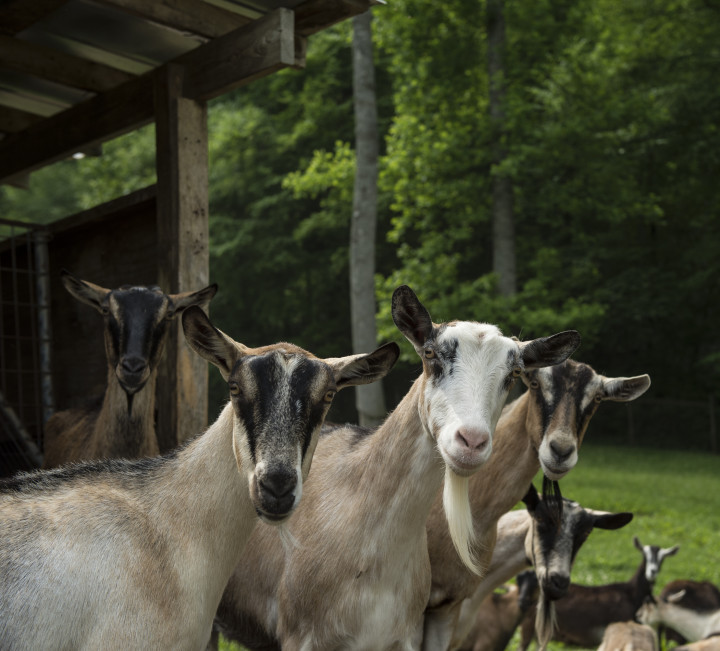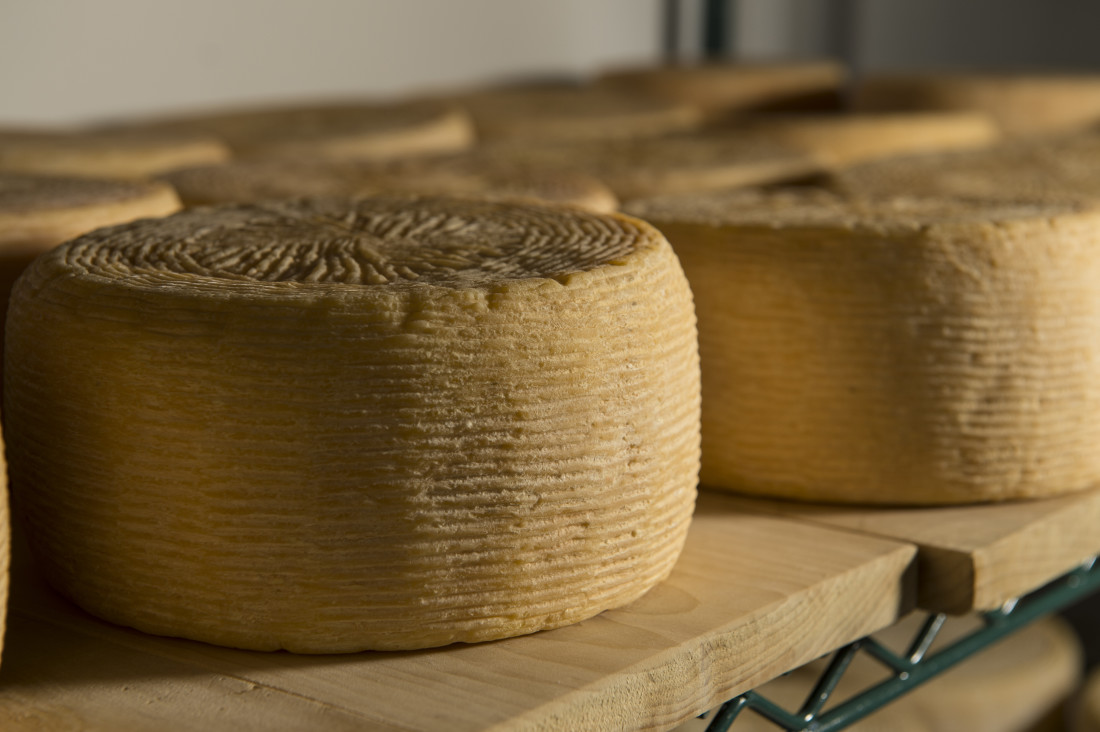The door creaks open, and the smell of ripening cheese fills the room. The aging cave at Looking Glass Creamery in Fairview is cool and moist, and the earthy scent hints at the complexity of cheesemaking. Jennifer Perkins, co-owner of Looking Glass, can’t smell it. She says she’s so used to it after years of making cheese that she doesn’t even notice anymore. Yet, day after day, she’s drawn back to observe the wheels of cheese as they age and ripen.
Looking Glass Creamery is part of a community of local cheesemakers and dairies that propel the artisan cheese movement in Western North Carolina. Working with the unique characteristics of the land while also working with fellow cheesemakers sets the local cheese scene apart, says Katie Moore, executive director of the WNC Cheese Trail. She’s seen dramatic growth in artisan cheesemaking nationally and says it’s particularly strong in the greater Asheville area.
According to the Appalachian Sustainable Agriculture Project, its first Local Food Guide in 2002 listed only two cheesemakers in all of WNC. Today, there are dozens listed in the region.
Partners in cheese
Small-scale cheesemaking lends itself to collaborative relationships between artisans and dairies. Looking Glass Creamery gets all of its goat milk from Round Mountain Creamery, which is just 13 miles away in Black Mountain.
On a morning last winter, a small transport tank arrived at Looking Glass. As goats grazed on the hill, about 70 gallons of milk flowed into the creamery’s holding tank. Winter is a lean time, and the goats slow down their milk production. In the summer, however, they’re producing about twice as much, according to Round Mountain Creamery owner Linda Seligman.
That increased production makes summer a good time of year for Looking Glass’ Perkins, who depends on Seligman’s farm for all of her goat milk. “We would get as much milk from her as we could buy,” explains Perkins. The two operations have forged a symbiotic relationship that helps to foster both economic and environmental sustainability in the region.

Seligman describes Perkins as one of the smartest women she knows and points to her as a driving force behind the growth of the WNC cheese scene. “She’s brought all of us together in such a way that we’re helping each other,” says Seligman. “We don’t tell each other our cheese secrets, but we’re helping each other, and we’re there for each other, and that’s really marvelous.”
The next day, Perkins oversees chèvre cheese as it hangs in her cheesemaking room. The milk she picked up yesterday from Round Mountain is quickly becoming cheese and will be on restaurant menus by the end of the week. As she watches the unwanted whey drip away from the precious curds, Perkins speaks to the merits of working with a small, local dairy like Round Mountain.
“Linda [Seligman] has been a great partner to work with,” Perkins says. “We communicate well about where the goats are at and how much milk they have, so we can adjust our production schedule.”
Before connecting with Round Mountain Creamery, Looking Glass bought its goat milk from an Amish dairy much farther away. Perkins says partnering with a local dairy bolsters her work as a cheesemaker and supports Seligman’s work as a farmer. These kinds of partnerships further a local food interdependency, where many different players work together to create a sustainable network of growers, producers and consumers.
“All these small cheesemakers popping up is a great opportunity for two industries to kind of grow up together,” says Perkins.
Waste not, want more
Round Mountain Creamery is both a working dairy farm and a cheese producer. Like most cheesemaking operations, it finds itself with excess whey at the end of the process. This liquid byproduct is often discarded by larger cheesemaking facilities, but at Round Mountain and Looking Glass creameries, it has a purpose.
Whey can be a nutritious addition to the diet of certain livestock, especially pigs. Aaron Travis, a local hog farmer from Sugar Hollow Farm in Fairview, picks up Looking Glass Creamery’s leftover whey to feed to his pigs. Another nearby farmer gives Round Mountain’s excess whey to his animals. These partnerships are an example of how local farms work together to create a food system that respects the region’s resources.
These environmental efforts fall in line with Seligman’s dedication to caring for the land and the animals that rely on her. At Round Mountain Creamery, she makes sure all of the goats have access to pasture on her hilly 28-acre property. She fosters the goats’ freedom to “eat a salad” as a natural supplement to the alfalfa pellets and local hay they consume daily.
The topography of the land guides her decisions about where to place the many elements of her farm and cheesemaking operation. “The animals are set up in such a way that they move through the pasture areas from being a kid to being a milker,” she says. Although consultants have urged her to alter the steep road that winds through her property, Seligman has resisted. “Our farm is teeny-tiny, so every little part of it is used for something.”
Building the cheese community
Without a network of consumers, the cheesemaking process stops at the aging-cave door. A seasonal business like cheesemaking relies on customers who understand the value of local food, especially during the leaner winter months. Community support is vital, whether people seek out artisan cheese at restaurants, in grocery stores or by visiting the creameries themselves.

Agritourism is essential to the growth of the industry, says WNC Cheese Trail’s Moore. Stepping onto a dairy farm or into a cheesemaking room can be the first step toward fully understanding what it takes to bring artisan cheese to the table, she explains.
The nonprofit Cheese Trail works to unite local cheesemakers and encourage the public to visit its 12 participating cheesemakers and small dairies. Moore says cheese trails and other agritourism efforts are beneficial to makers, as well as to consumers who want to better understand where their food comes from and how it impacts the sustainability of the region.
“You have people being more educated about the environment,” she notes. “I think that plays a big role in why people are looking at local and the impact it has when you can decrease your footprint by eating food that’s more locally sourced.”
For details about visiting local creameries, visit wnccheesetrail.org. Learn where to find local cheese at markets, restaurants and grocery stores in ASAP’s Local Food Guide at appalachiangrown.org.




Before you comment
The comments section is here to provide a platform for civil dialogue on the issues we face together as a local community. Xpress is committed to offering this platform for all voices, but when the tone of the discussion gets nasty or strays off topic, we believe many people choose not to participate. Xpress editors are determined to moderate comments to ensure a constructive interchange is maintained. All comments judged not to be in keeping with the spirit of civil discourse will be removed and repeat violators will be banned. See here for our terms of service. Thank you for being part of this effort to promote respectful discussion.